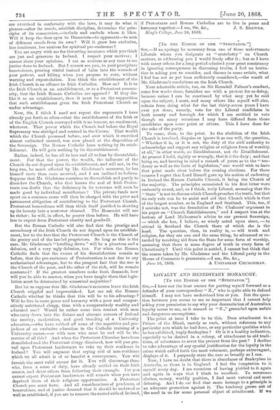[To THE EDITOR OF THE "SPECTATOR."]
Sin,—If an apology be necessary from one of those unfortunate Liberals whom you designate as " crotchetty " on Church
matters, in addressing you I would freely offer it ; but as 1 have with many others for a long period admired your great consistency in ignoring consequences in discussing truths, I feel no hesita- tion in asking you to consider, and discuss in some article, what I feel has not as yet been sufficiently considered,—the result of Mr. Gladstone's resolutions on the Irish Church.
Your admirable article, too, on Sir Roundell Palmer's conduct, some few weeks since, furnishes me with a pretext for so doing, because unless I can be convinced by what may yet be said upon the subject, I must, and many others like myself will also, refrain from doing what for the last thirty-seven years I have ever yet done, namely, vote for the Liberal candidates in both county and borough .for which I am entitled to vote though on many occasions I may have differed from those candidates upon some point or others. This I have done for the sake of the party.
To come, then, to the point. In the abolition of the Irish Church is involved, disguise or ignore it as one will, the question, "Whether it is, or it is not, the duty of the civil authority to acknowledge and support any religion or religious form of worship at all," in other words, an Establishment, not the Establishment. At present I hold, rightly or wrongly, that it is the duty ; and that being so, and bearing in miud a remark of yours as to the "ten- dency as well as the facts of legislation," one would wish to have that point made clear before the coming elections. For these reasons I regret that Lord Russell gave up his notion of endowing in Ireland the Roman Catholic Church, it being the Church of the majority. The principles enunciated in his first letter were eminently sound, and, as I think, truly Liberal, assuming that the "State "is not to discuss which Church preaches the truth, but that its only rule can be to assist and aid that Church which is that of the largest number, as in England and Scotland. This, too, if I mistake not, was the foundation of Dr. Chalmers' argument in his paper on "Church Establishments," and I suspect was at the bottom of Lord Melbourne's advice to our present Sovereign, — which she has, I believe, so wisely acted upon since, — to attend in Scotland the Church there of which she is the head. The question, then, in reality is, — will truth and religion, for they are one and the same thing, be advanced or re- tarded by receiving aid from the State for some form of worship, assuming that there is some degree of truth in every form of Christianity? Until this point is settled, I cannot but think that the course taken by Mr. Gladstone and the Liberal party in the House of Commons is premature.—I am, Sir, &c.,


































 Previous page
Previous page